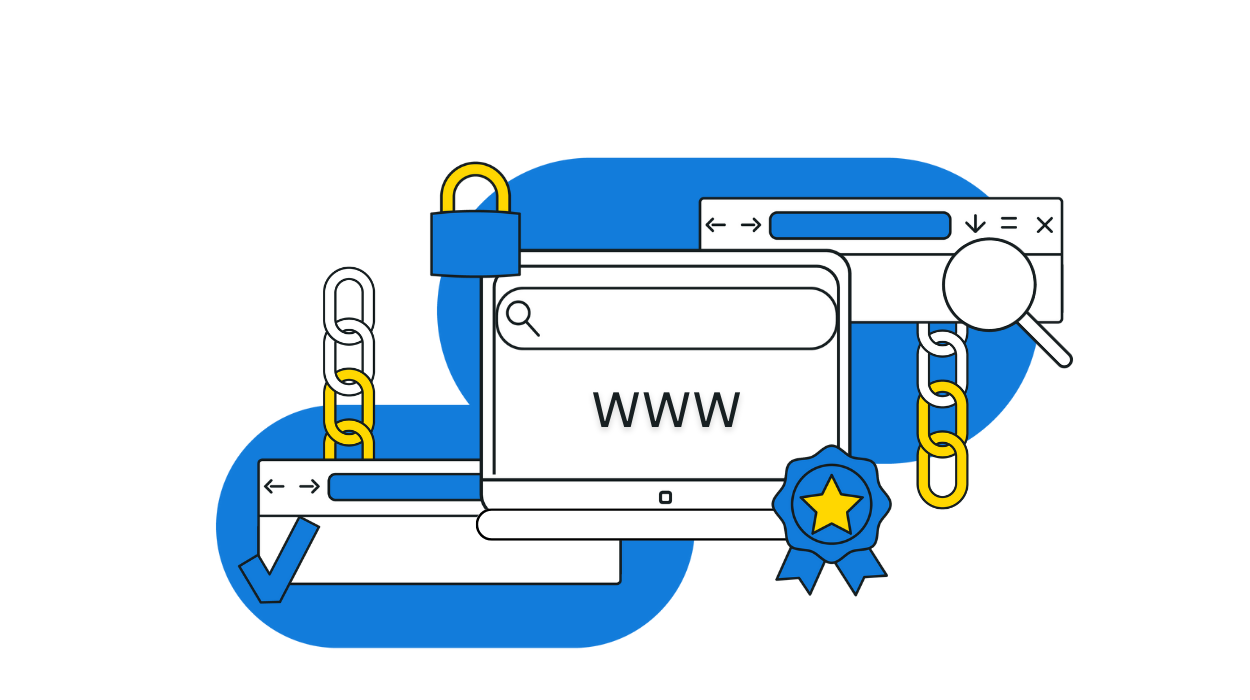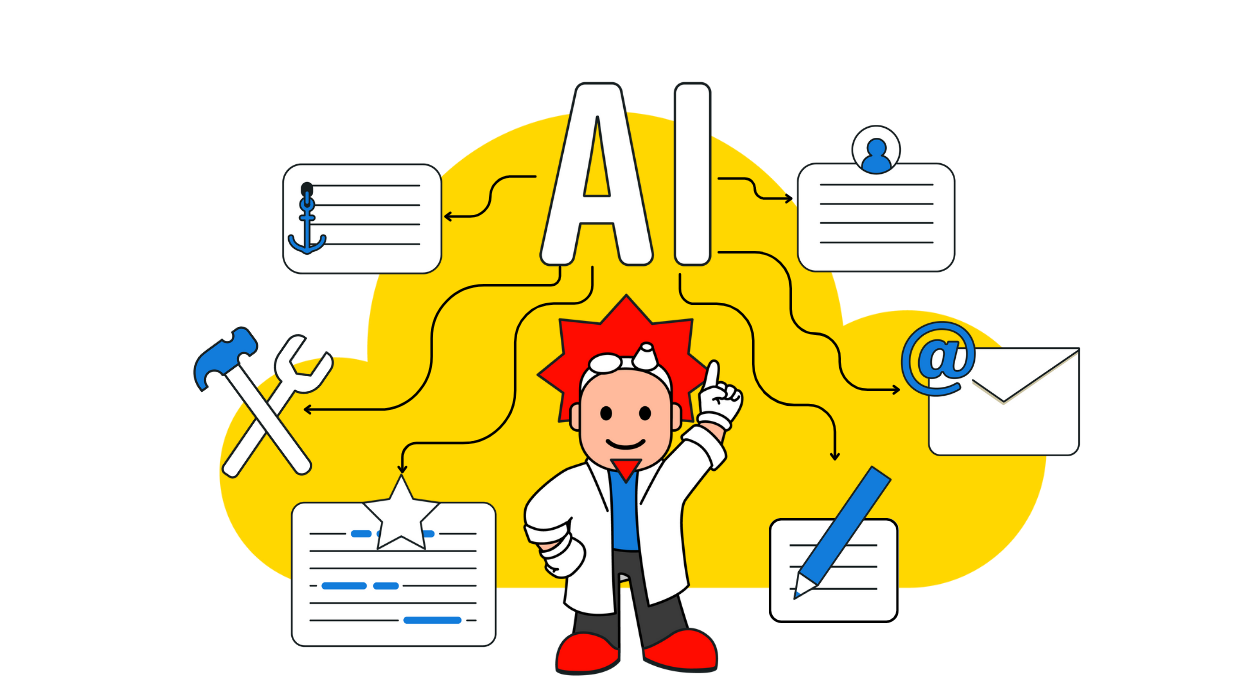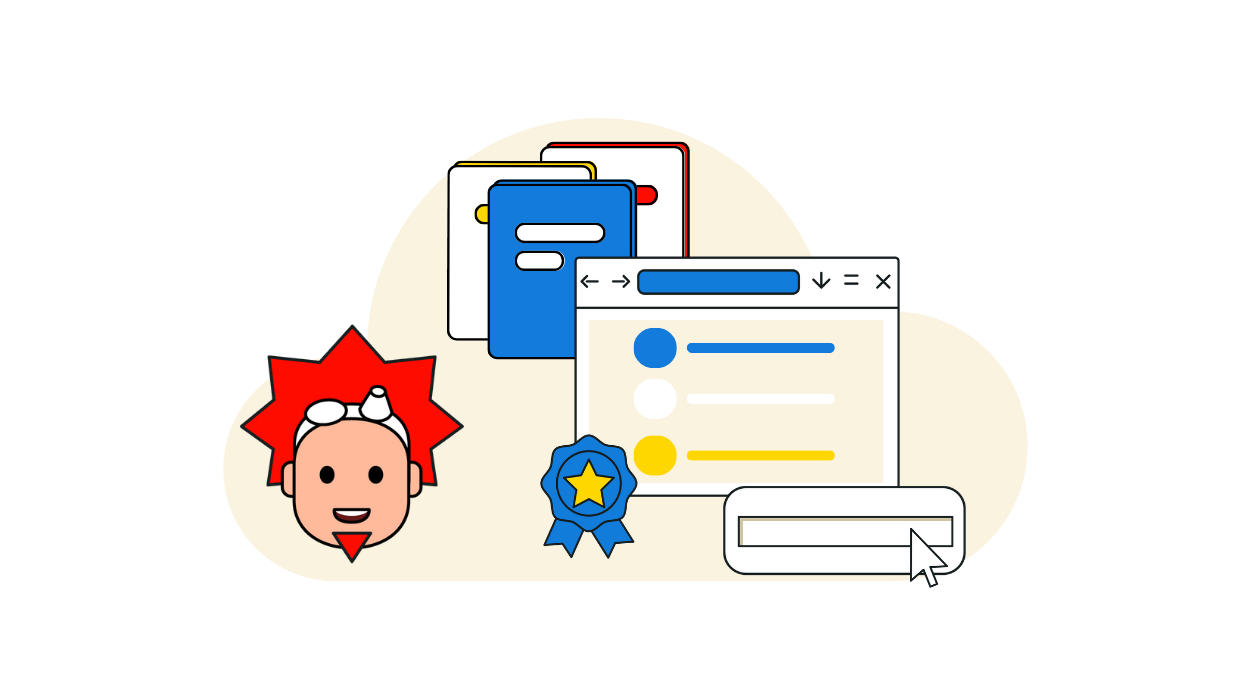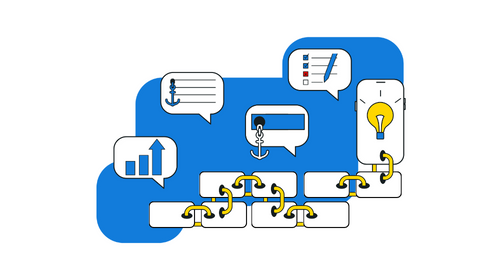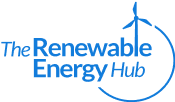Link-building in 2023 is the SEO version of the Hunger Games. Ranking in competitive search results requires outnumbering, outsmarting, and outmaneuvering your competitors through superior link acquisition and digital PR. Simply put, the odds of ranking without a solid link-building strategy are not in your favor.
While search engines claim link-building isn't a direct ranking factor, links remain the single most important signal that you create great content. The sites that secure the most powerful, authoritative links will claim the coveted first page rankings, while inferior competition fights over the scraps. Links are the scepter of power in the kingdom of search.
However, buying links alone isn't a viable long-term solution—diversity is the key here. If you're serious about ranking your site, especially for competitive keywords, gaining contextual and editorial links through relationship-building and outreach with high-authority websites in your niche must be included as one of the core strategies in your SEO campaign. Easier said than done! With limited time and resources, how do you determine which backlinking strategies will yield the best results?
The answer lies in focusing on important metrics, such as domain authority. While it's a third-party metric that Google officially does not give a damn about and can be amplified artificially, Domain authority correlates the quality and number of a website's backlinks, provided these have been gained legitimately and naturally. By analyzing DA metrics, uncovering authoritative competitors and partners, and implementing targeted link-building campaigns, one can achieve scalable, long-term link wins.
This comprehensive guide will explore how domain authority can be a game-changer for SEO and digital marketing experts in 2023 and beyond and how it can help you master advanced link-building strategies to beat your less sophisticated competitors in their own game.
What is Domain Authority and Why You Should Care
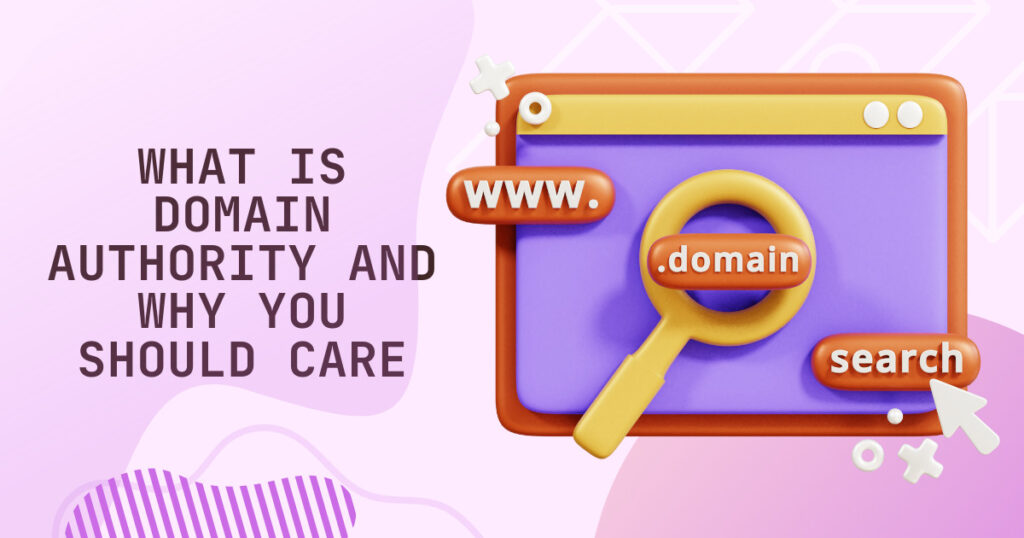
Domain authority is the popularity contest of the SEO world. It's the number that determines if your website gets to sit at the cool kids' table (top of Google's search results) or gets relegated to the proverbial nerd corner (slowly sobbing on the lower of the SERPs). Developed by Moz, DA measures the quality and strength of a domain in terms of its backlink profile (total number, niche relevancy, authority, and other crucial merits of the third-party links pointing back to a site) on a 100-point scale, mimicking Google's trustworthiness for a particular website. A higher score than the competition means you're more likely to snag that coveted first-page slot. While average sites fall between 40 to 50, you can consider yourself one of the SEO elites if you're able to get anything over 60.
You should care about the Domain Authority of your backlinks (and your website's DA, of course) because it indicates the authority of those links in your niche, meaning getting backlinks with higher DA can help you rank better and drive more organic search traffic to your website.
Therefore, monitoring the DA scores of your links over time should be an essential part of your overall SEO strategy, and significant changes in this metric can signal that you need to revisit your link-building strategy.
That being said, domain authority can be artificially inflated. Therefore, it won't be wise to rely on this metric solely. Analyzing the site manually while considering other crucial parameters to check if they are aligned with its DA score is essential to weed out sites with fabricated domain authority numbers.
How to Identify Websites With Manipulated Domain Authority

Below are some quick signs to help you spot sites with spurious DA scores gained in non-organic ways:
"Redirect Notice" hack:
Spammers behind manipulated Moz DA scores have long discovered quite a clever little trick. They've found an exploit in Moz's algorithm, which assumes that any link from a big-shot website, regardless of its type, must mean serious business.
So many came up with a way to game the system using Google's own tools—they create "redirect notice" pages, which Google whips up whenever someone clicks a link redirecting them somewhere else.
Then, they blast out oceans of links to these redirect pages from every blog, dumpster directory, and spam site they can find. And Moz's bot crawls all these links, assumes they're legit, and rewards the target site with a big, juicy DA score.
But this trickery can be spotted by anyone with the right tools and a keen eye. A quick check with Moz, Ahrefs, or other link checkers will easily turn up these redirect notices and their unnatural link profiles.
Higher Spam Score:
If the website has a high spam score, it's likely that it has engaged in illegitimate practices to acquire links and increase its DA.
A high percentage of backlinks from low-quality domains:
This is known as "link farming," and search engines can detect these unnatural link profiles. Use tools like Ahrefs, Moz Link Explorer, or Majestic to analyze the sites linking to them.
Keyword-focused content that lacks depth or expertise:
Scan their blog posts and content to make sure they provide real value, not just target keywords.
DA increasing very rapidly in a short period of time:
Natural growth happens gradually. Quick jumps of 10+ points can be a signal that they used manipulative tactics.
High amounts of traffic from questionable sources:
If much of their traffic comes from paid ads or social bots instead of organic search, their DA may not accurately reflect their true authority.
Buying bulk backlinks from low-quality sites:
This is known as "link farming," and search engines can detect these unnatural link profiles.
Publishing low-quality, "thin" content solely for ranking keywords:
This content lacks real value for users, and search engines can see through it.
Using tricks and loopholes to quickly gain metrics like shares, links, and ranking signals:
Google aims to identify and discount these artificial signals.
DA vs. Spam Score: The Battle for Backlink Redemption

DA and Spam Score. It sounds like a bad '80s buddy cop show, right? But these two metrics are actually locked in an eternal battle for your link profile and search rankings. So, let's break down our protagonist and antagonist below.
As already explained, Domain Authority (DA) is the hero in this story. Also developed by Moz, Spam Score, on the other hand, is the villain trying to corrupt your link profile. This metric identifies "spammy" links on a scale of 1 to 100%, with lower scores being better. Things like comment spam, manipulative SEO tactics, and low-quality links can raise your Spam Score.
DA and Spam Scores directly oppose each other. While your white hat links build up your Domain Authority, your Spam Score should lower. Similarly, spammy, unnatural links that increase your Spam Score will hurt your DA.
Moz's experts utilized advanced machine learning technology and analyzed a gigantic dataset of penalized and banned websites in order to identify 27 signals that are correlated with spammy domains.
For example, spam sites usually don't have a lot going on. So, if Moz's web crawlers only found a couple of pages on the site, that's a red flag and contributes to this metric.
Certain website endings, or domains, are also popular with spammers—stuff like .download, .stream, or .win. If a site uses one of those, it is also considered one of the factors in the Spam Score.
Spam sites also tend to have weirdly long domain names, especially if they have numbers in them as well. They might have super long or short page titles, extended descriptions, and huge meta keyword lists. These are pretty shady, so Moz takes them into account when calculating this score.
In addition, such sites usually don't use a favicon to represent the site either. And they skip out on other stuff most real websites have, like SSL certificates, Google Font API, Google Tag Manager, tracking pixels from Facebook, real contact info such as phone number or email address, and LinkedIn profile.
However, while none of these factors indicate spam with certainty, the more signals a site exhibits, the higher the likelihood it could be identified as spam with a larger Spam Score.
How to increase your site's Domain Authority while reducing its Spam Score

Here are some effective ways to improve your Domain Authority and cut down your Spam Score at the same time:
Build high-quality backlinks from authoritative sites:
Focus on earning links from sites with a high DA and low Spam Score in your niche. These links will pass powerful rankings signals and boost your own DA.
Diversify your backlink profile:
Earn a mix of link types, including editorial mentions, guest posts, directory listings, resource page links, and influencer endorsements. A varied, natural-looking profile is best.
Publish amazing, useful content:
Creating great content that earns links on its own merit is the best link-building strategy. Pitch content ideas to authoritative sites and influencers in your industry.
Disavow low-quality links:
If your Spam Score is high due to spammy historical backlinks, you can actually disavow those links to improve your score. Submit a disavow file to Google through Search Console.
Build internal links to new content:
Linking from existing authoritative pages/posts on your domain to new content helps pass link juice and signals importance to Google. This can boost DA over time.
Earn high DA backlinks with time:
Focus on link building over the long term. Quickly earned backlinks may seem suspicious and hurt your Spam Score. But authoritative links earned slowly and consistently over 6-12 months will increase your DA.
Get links from sites ending in .edu or .gov:
Google considers them relatively more trustworthy.
Avoid spammy or manipulative tactics:
Things like paid links, link farms, comment spam, and other unnatural linking techniques will plummet your DA and skyrocket your Spam Score.
Monitor metrics and make changes:
Check your Moz metrics regularly and look for any drops in DA or spikes in Spam Scores. Then make adjustments to your link-building approach to mitigate issues and support good metrics.
Be patient through Google Dance fluctuations:
Your DA and Spam Score may fluctuate with Google algorithm updates before stabilizing again. Don't make drastic changes in response. Stay the course with high-quality white hat link building.
With time and consistency, these techniques can turn the tide of battle in favor of your Domain Authority and overcome a high Spam Score. But continual monitoring and adjustments to your strategy are critical, so keep optimizing your approach whenever necessary.
Conducting a Domain Authority Analysis

Checking the domain authority of your website and its backlinks is crucial to understanding your overall link profile and how you stack up against competitors. Monitoring DA over time also helps ensure your link-building campaigns are actually effective at boosting your rankings and traffic. Thankfully, one can use Moz's free checking tool to analyze domain authority.
The first step is checking your own domain authority score. Moz's free Link Explorer tool provides your PA (Page Authority) and DA on a 100-point scale. A score above 40 indicates a reasonably well-optimized site, while sites with 60 or higher are very authoritative.
Next, analyze the domain authority of competitors ranking above you for your target keywords. See how much higher their DA is, and make that your first link-building goal. If your competitors have a DA in the 60s, but you're only at 40, aim to increase your score by at least 20-30 points to outrank them.
You should also check the DA of sites that currently link to you. Ideally, most would be in the 40-60 range or higher. If many low authority sites (under 30 DA) or spammy sites link to you, that can actually hurt your rankings by associating you with low quality. Disavowing those links may be necessary to improve your DA and search positions.
After establishing your initial DA, monitor your score regularly to see that it's increasing over 3-6 months of link building. This confirms your campaigns are successful and leads to higher rankings. If your DA remains unchanged or drops, you'll need to reevaluate your strategy.
A good goal is to increase your domain authority by 5-10 points every 6 months through effective link building. While quick increases of 20 points or more in a short time span may not trigger a Google penalty, gradual progress at a realistic pace will support long-term rankings success.
You can set periodic goals to increase Domain Authority and check on progress to ensure your link-building strategies consistently deliver results that will boost you above competitors. Analyzing both the challenges and opportunities can guide your approach to earn more authoritative links and advance in the rankings over the long run.
The Relationship Between Domain Authority and Link Building

Domain authority and link-building truly fuel each other. As you build more high-quality links to your site, your DA score rises. And as your DA increases, you become a more trusted authority in your niche and can earn even better links. It's a cycle that feeds on itself!
Let's break this down. Your domain authority, or DA, is a score from 1 to 100 that estimates how trustworthy and authoritative Moz predicts search engines will find your domain to be. The higher your DA, the more "link juice" or "ranking power" your site has; Hence, Google and other search engines see you as an influencer in your industry.
Now, Moz calculates your DA based on the quality and quantity of links pointing to your domain from other authoritative sites. So when you build links, especially high-DA ones, your score goes up, making it easier to get more and better links, which further boosts your Domain Authority. See how this works?
So, the key is earning high authority links, not just any links. DA scores pass through links, so a link from a website with DA 60 will transfer more authority than one with DA 30. A higher DA link means a bigger boost for your site's authority.
While link quantity does matter in Google's algorithm, link quality and authority are far more important. That's why you'll get the biggest bang for your buck, so to speak, from earning fewer but more powerful links versus many weak ones.
The takeaway here is that growing your DA through strategic high-authority backlinks needs to be the cornerstone of your SEO and link-building strategies. Monitor your DA regularly to ensure you're moving the needle through your search marketing efforts. Gradual, consistent progress over months is the healthiest approach, while quick link spikes can look unnatural and may lead to penalties.
Overall, domain authority and link building are intrinsically connected. Focus on getting a steady diet of authoritative links to boost your site's DA, and let the high domain authority score open doors to even better links. Therefore, all you need to do is keep nourishing this cycle; your site's authority and search dominance will continue to strengthen over the long run.
How To Build High Domain Authority Links for Maximum Ranking Power
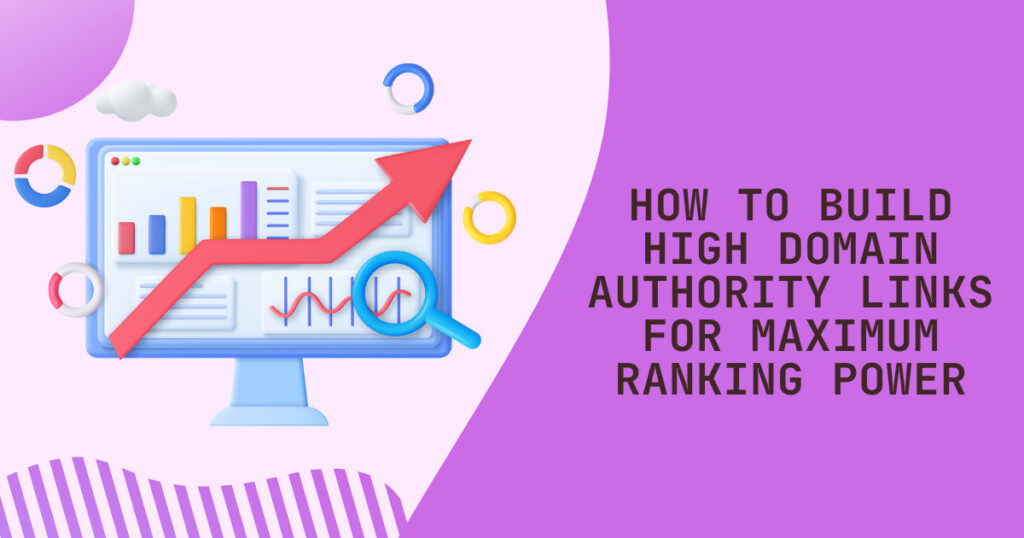
Building high DA links should be a top priority in your SEO strategy. The tactics that work best target authoritative sites in your niche to gain valuable backlinks. Here are some proven link-building techniques that earn authoritative links.
Guest Blogging on Authoritative Blogs
Pitching guest posts to leading industry blogs is a surefire way to gain high-DA links with your content. Study potential blogs to ensure your idea provides real value to their readers. Develop a relationship with the editor before pitching, and focus your content on amazing quality rather than link needs alone. A relevant, compelling guest post on an authoritative blog could become a permanent high-DA link that boosts your own domain authority over time.
Resource Page Link Building: The Gift That Keeps On Giving
Getting your content added to an authoritative resource page, like "Best Tools for xyz," is link-building gold. Research relevant resource pages in your niche and pitch how you meet their content needs. Be sure to demonstrate your expertise and credibility. A link on a well-ranked resource page leads to ongoing direct and referral traffic, social shares, and higher authority from the association. Relationship building is critical here, so nurture connections with page owners and become a go-to expert source in your industry.
Broken Link-Building: Find 'Em and Pitch' Em!
This tactic involves finding broken links or 404 errors on authoritative sites in your niche and pitching an updated replacement. Check such sites for the most relevant broken links you could replace, then email the webmaster your suggested content and the 404 errors you found on their site. If accepted, this earns you a high-DA link with long-term potential for more. Tools like Ahrefs and Moz make finding broken links easier.
Sponsoring Influential Industry Podcasts, Newsletters, and Events
Look for influential podcasts, newsletters, and popular industry events accepting sponsorships. As an authority brand sponsor, you gain a platform to connect with your target audience and grow brand awareness. You'll also get a valuable high-DA link that enhances your credibility and search rankings. Develop connections by engaging with the influencers and their community before and after signing on as a sponsor, which will help you tap into new networking and link-building opportunities over the long run.
Creating Tools and Resources for High-DA Sites: Free Stuff for Links!
Create content and applications highly sought after by industry influencers, like free tools, data studies, or other resources. Then, pitch it as something of value exclusively provided for their audience. Blogs, media companies, and trade organizations with high Domain Authorities are perfect for targeting here. By giving them a resource that their readers will truly benefit from and appreciate, you stand to gain a valuable link, publicity, brand recognition, and referral traffic, all while nurturing a new relationship that may lead to additional link wins in the future. But whatever you create needs to be high quality if you want to gain high-authority links and bigger benefits as a result.
Putting in the work to earn high-authority backlinks through relationship building and outreach will yield the best long-term results for your site's domain authority and search rankings. While building links at scale is tempting, keep your focus on creating real value over quantity to achieve real, lasting progress in today's Googleverse. With the right process and patience, you can outrank competitors by gaining links they only dream of.
However, it's also critical to track the impact on your search rankings and Moz metrics. Make sure new links positively impact your domain authority and search traffic over 3-6 months. If changes seem abnormal or you spot any dropping metrics, adjust your strategy right away. The last thing you want is a negative Google update triggered by any unnatural link-building activity.
Don't Get Those Low-Quality Links: Shady Link-Building Tactics to Avoid
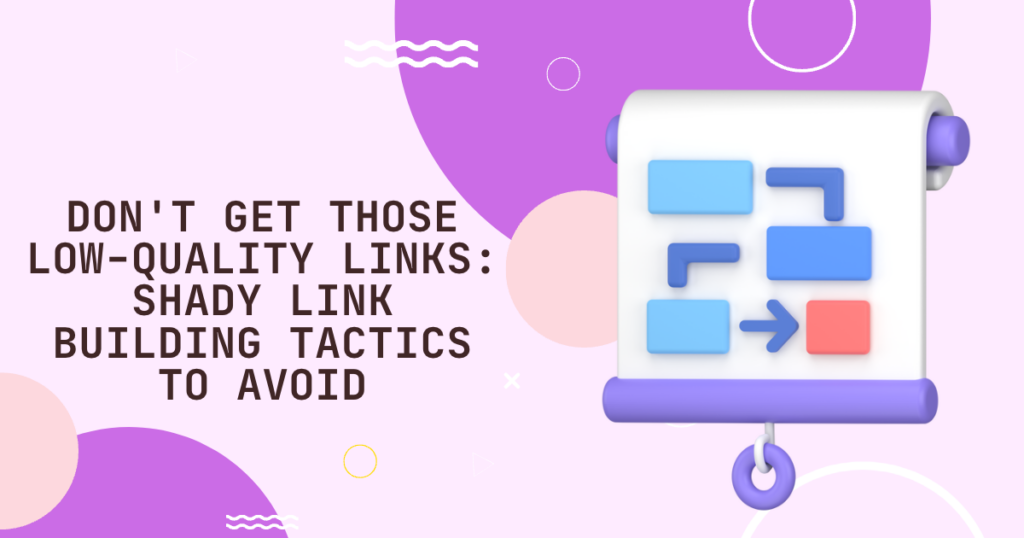
While high-DA link building should be your focus, there are several controversial methods you should steer clear of altogether. These techniques often attract spam penalties by manipulating rankings instead of genuinely earning links. Google's algorithm has gotten too advanced for these spammy tricks to work, and they'll seriously hurt your site's authority in the long run.
Commenting for Links: Don't Do It!
Leaving blog comment links used to be an easy spam tactic, but now Google ignores or penalizes them. Comment links provide no real SEO value and make you look manipulative. They're not worth the risk.
Blog Networks: Private Link Networks are a Big No-No
Avoid services that promise lots of links from private blog networks or link farms. These are almost always considered link schemes that significantly drop your rankings.
The danger here is that most such networks consist of high-DA domains, and you may be tempted by the apparent DA of these blog networks—but don't let that fool you. They are still faking their DA scores by using dubious strategies. Their sole purpose is really just to rank websites rather than create or share actual value.
Google aims to deindex and penalize this activity. Your rankings and authority can plummet as a result of buying into what seems like an easy solution but is really just a scam. These networks also frequently disappear once Google takes action against them, leaving you with many broken links and damage to undo.
Fiverr Gigs: Cheap Link-Building is Bad Link-Building
While Fiverr has some legitimate services, their gigs frequently promise bulk SEO links, shares, and other spam for $5. Don't use these "too good to be true" cheap gigs, as the links can hurt your site's credibility and send you to the inner pages of search results. Focus on real relationship-building and high-quality links instead.
Link Farms: Run Away as Fast as You Can!
So-called "link farms" offer many links of low authority and DA (if any) for a fee. These bulk links from spam sites have zero SEO value and risk seriously damaging your domain authority through manual penalties and loss of rankings. Put simply, no quantity of bad links will help you. Save time, money, and trouble by avoiding link farms and building premium quality links the right way.
The bottom line is that acquiring low-DA links in bulk may seem irresistible but doesn't work long-term and threaten your online success. Protect yourself through safe and effective link-building with authoritative sites in your niche. While it requires effort to research link targets and establish real relationships, the rewards of gaining truly valuable backlinks make it well worth your time.
Managing Your High DA Link-Building Campaigns
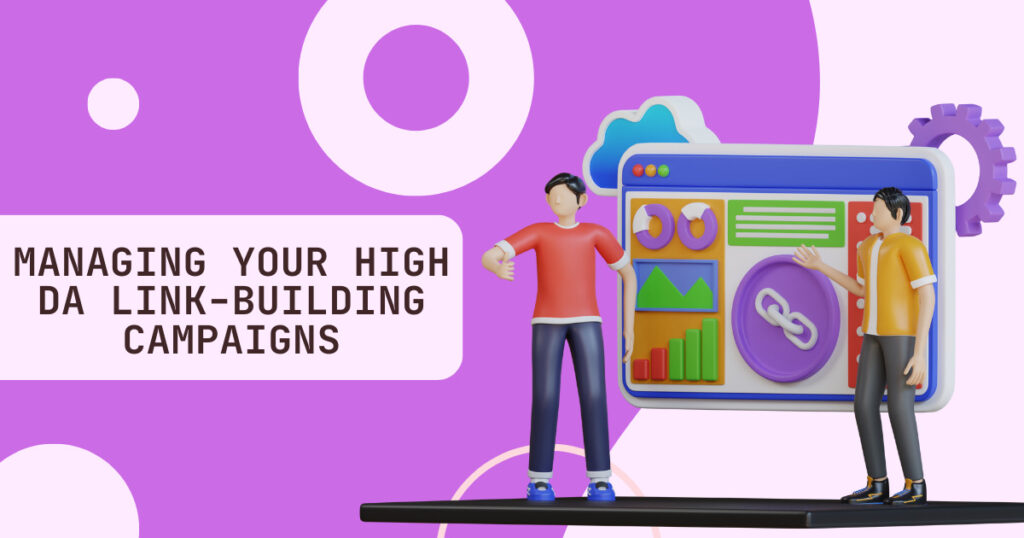
Running effective link-building campaigns tailored to gain high Domain Authority backlinks requires the right tools and processes to keep you organized and on track. Here are some tips for managing and maintaining a clean link profile.
Link-Building Tools to Help Automate the Process
Use tools like Ahrefs, Moz Link Explorer, and SEMrush to find new high-DA link opportunities, analyze your competitors' links, and monitor your overall link equity. Automating parts of research and outreach can save tons of time while optimizing your efforts. Look for tools with time-saving features like email outreach, link checking, and campaign management options.
How to Organize and Prioritize Your Link-Building Outreach
Focus on relationship building and mutual benefits, not just your link needs. Categorize outreach by relationship level, experience required, and potential impact. Focus on balancing longer-term relationship development with some shorter turnaround wins while tracking and reviewing your outreach to determine response rates by the target. Most importantly, improve your pitching and be sure to customize each pitch to match the site you're contacting.
Measuring the Impact of New Links on Your DA and Rankings
Check your DA, rankings, and traffic regularly after securing new links to gauge their impact over time. A well-earned high-DA link can start influencing your metrics within just a few weeks. So it's crucial to identify the links that provide the biggest long-term benefits to determine the best targets and outreach approaches going forward. The insights you gain will make your future link-building endeavor even more effective.
When to Pause Your Link-Building Campaigns
If your DA or rankings drop significantly after a new link, it may be passing along penalties. So stop your campaigns right there, assess new links for issues, and remove any that could be causing harm. It's also a good idea to pause outreach during platform or algorithm updates until the dust settles and you understand any ranking shifts. Limit campaigns around major holidays as well when audiences are more difficult to reach, and responses decline. All in all, pausing your link-building projects strategically can help you avoid wasted effort and unintended consequences.
Ongoing Link Audits and Maintenance: Rotten Link Removal
Check your link profile regularly for "rotten" links that could damage your authority, like spam sites, manipulative link networks, and broken links. Remove these harmful links through reclamation or creating a link disavow within Google's Search Console. Also, review new links you recently obtained to ensure they remain active and pass authority. Staying on top of your overall link equity and removing potential risks helps keep your DA and rankings on an upward path.
Common High DA Link-Building Myths and Mistakes

Let's debunk some high DA link-building myths and correct common mistakes to optimize your campaigns, as your authority and rankings depend on the right approach.
Myth 1: Domain Authority is dead (it's not!)
Domain authority is very much alive and still crucial for rankings. While no metric is perfect, DA remains one of the best ways to gauge a site's authority and value as a link target. Ignore DA at your peril; it's a mistake to think links from any source pass equivalent juice when Google highly favors authority in its algorithm.
Myth 2: You can automate the entire link-building process (you wish!)
Although automation tools help with research and outreach, relationship building is fundamentally human. Do the work to connect with industry influencers truly. No bot can replicate the rapport and trust required for the high-DA opportunities that boost your rankings most.
Mistake 1: Focusing on link numbers over link quality
Aiming for link volume alone is foolish when Google values authority over quantity. Even if you gain many links, low-quality ones from spam sites only hurt your credibility. Hence, spend your effort on getting solid editorial links from authoritative sources instead of chasing high numbers.
Mistake 2: Stopping link building once you reach page one (don't do it!)
Just because you rank on the first page now doesn't mean you'll stay there forever. Google frequently updates its algorithm, and competitors won't rest. So, maintain your authority through ongoing link-building focused on relationships, not just rankings. You must keep earning a steady flow of high-DA links to avoid losing ground, as consistency is the key here.
Mistake 3: Spending too much time on low-DA links (doesn't worth it)
Don't waste effort on weak links with little potential impact. While a few easy wins are fine, focus mainly on authoritative targets that significantly boost your DA and rankings when earned. Rather than chasing many poor links, build relationships with influencers for sustainable link gains. Your time is better spent on outreach to high-DA sites that will make a difference and propel your success.
The Future of Link Building and Domain Authority
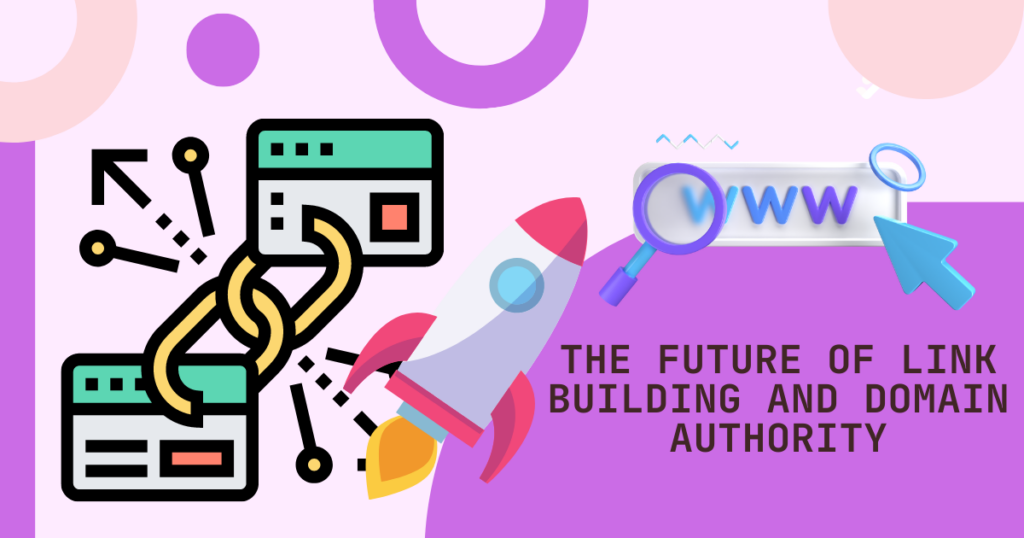
The link-building and SEO landscapes are constantly evolving. Here's what the future may hold for domain authority, link-building campaigns, and search marketers.
Google is cracking down on poor-quality linking practices
Google will likely tighten enforcement against manipulative tactics like spam links, link farms, and private blog networks, and algorithms may get even smarter at detecting unnatural link patterns. So, focus on high-authority links built through relevant industry affiliations to avoid issues.
It's only going to get harder to build high-DA links at scale
Influential sites will raise barriers against low-quality guest posts and link inserts. Similarly, resource pages and broken link building will require more relationship development. However, scaling link development will still be possible through smart automation combined with custom outreach for the highest-DA opportunities.
Artificial Intelligence and Machine learning will play a larger role in identifying "unnatural" link patterns
Google and other companies are reportedly developing AI and ML models to detect link manipulation at a much larger scale. Then again, advanced machine learning models may also power smarter automation that helps to earn more natural-looking links and online visibility. Hence, link builders must focus on relationship-building and avoid overly aggressive tactics, or new cutting-edge technologies could be used against them to flag their questionable methods.
Digital marketers will need to double down on relationship-building approach
Now more than ever, SEO experts must create real connections with authoritative sites in their industry to gain valuable links. Link building and online visibility as a whole already depend on trust, credibility, and association between businesses, and these factors will be further emphasized in the coming years.
Conclusion: Why You Need to Prioritize High DA Link Building
As we can see, link acquisition campaigns focused on authority and relationships are essential for long-term search ranking success. And while links remain the most vital ranking factor, your domain authority depends on credible links from authoritative sources, which provides the best measure of a site's credibility and capacity to pass value through links. Therefore, focus on building relationships with high-authority properties that boost your website's DA for the greatest gains.
Undoubtedly, a few high-DA links can significantly impact your rankings and traffic. Meanwhile, poor-quality links do little to help and risk damaging your authority or incurring penalties. Therefore, spend the bulk of your time on building meaningful connections and earning authoritative links.
Now that you know the power of DA, use tactics that consistently improve yours over time through authoritative targets and value. Nurture relationships with influencers, pitch high-DA guest posts, build resource pages and find broken link-building opportunities. These approaches help you win the most sustainable, impactful backlinks.
However, it’s crucial to understand that neither every link is the same, nor all backlinks building strategies suit every business.The tactics that work wonderfully for an enterprise B2B company may fail for a small business. Your high DA link development approach must align with your business model, goals, and target audience.
For example, guest blogging on highly authoritative industry publications may be ideal for a B2B brand but ineffective for a local retail store. The store would benefit more from community links, local directory listings, and outreach to regional influencers. Meanwhile, an enterprise software company should aim for links from reputable technology publications read by corporate decision-makers. Nevertheless, if you own an online shopping store and business and effective ecommerce link building strategies, you can contact us here for a quick consultation.
Finally, check your DA, rankings, and traffic regularly after securing new links to see which provides the biggest benefits. Then adjust your strategies accordingly. Likewise, if metrics drop after getting a link, investigate why and remove any potential threat. Monitoring the real impacts of your links is critical to an effective long-term link-building campaign.
